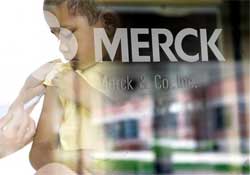
Merck & Co. Inc. has been accused of overstating its mumps vaccine benefits. Accusations are part of a new whistleblower lawsuit filed in federal court. The lawsuit alleges that Merck overstated the efficacy of its mumps vaccine; however, Merck argued that the allegations have nothing to do with the drug’s safety, describing the lawsuit as […]
 Merck & Co. Inc. has been accused of overstating its mumps vaccine benefits. Accusations are part of a new whistleblower lawsuit filed in federal court.
Merck & Co. Inc. has been accused of overstating its mumps vaccine benefits. Accusations are part of a new whistleblower lawsuit filed in federal court.
The lawsuit alleges that Merck overstated the efficacy of its mumps vaccine; however, Merck argued that the allegations have nothing to do with the drug’s safety, describing the lawsuit as being “completely without merit,” wrote 4Traders. Merck also said it intends to “vigorously defend itself” and that the U.S. Department of Justice has declined to participate in the case following its two-year investigation. The U.S. government paid hundreds of millions of dollars for the vaccine.
Vaccination is the best way to protect against the mumps, says the U.S. Centers for Disease Control and Prevention (CDC). A contagious disease, mumps can cause fever, headache, and inflamed salivary glands and was common in children and young adults before vaccinations were utilized years ago, said 4Traders. Despite vaccinations, however, outbreaks did occur in 2006 and 2009. Merck introduced the first mumps vaccine 45 years ago; since the 1970s, the vaccine has been part of a combination injection that includes childhood immunizations against rubella and the measles.
For more information, check out how vaccine injury lawyers can help with your case
The lawsuit, filed by former Merck virologists Stephen Krahling and Joan Wlochowski, states that the firm allegedly defrauded the United States for over 10 years by concealing information that the vaccine had become less effective, said 4Traders. The government, say the former employees, have been paying for a product that does not meet Merck’s claims.
The lawsuit seeks a judgment against the drug maker that totals three times the damages suffered by the U.S. government as well as the maximum permitted award for the former employers under federal whistleblower laws, explained 4Trader. The lawsuit was originally filed in 2010 in the U.S. District Court for the Eastern District of Pennsylvania and was unsealed last week when the Department of Justice declined to be involved in the case.
Merck did confirm the names of the former employees, saying neither has worked for the firm in 10 years. “It’s important to understand that none of the allegations in the complaint relate to the safety of M-M-R II”—the vaccine in question—”and we remain confident that M-M-R II helps protect against measles, mumps, and rubella as described in the labeling for the vaccine,” Merck said in a statement. “M-M-R II continues to be recommended for routine administration to children by public health authorities around the world, including the U.S. Centers for Disease Control and Prevention and the U.S. Food and Drug Administration,” the company said, wrote 4Traders.
Speaking of Merck vaccine safety, last year we wrote that Merck took some heat from the U.S. Food & Drug Administration (FDA) over contamination in some of its vaccines that involved charred pieces of plastic shrink-wrap. One of those vaccines was the MMRII.
The issue is not new for Merck. A formal FDA letter was issued to Merck in 2008 over problems at its West Point, Pennsylvania plant, and the problems didn’t end there. Agency inspection reports indicated other problems including metal pieces in some products, cracked vaccination vials, and Merck delaying its adverse event reporting to the FDA concerning its West Point plant. The plant is Merck’s largest for vaccine manufacture.
The prior year, Merck was accused of neglecting to report certain adverse events concerning patient use of its drugs within the legally mandated 15 days. In February 2009, an FDA inspector wrote that metal particulates were found in some Merck products and noted the presence of cracked vials. The report indicated that Merck should have conducted a more thorough investigation and follow-up; doctor complaints have also been received by Merck over bubbling and foaming in some vaccines.


